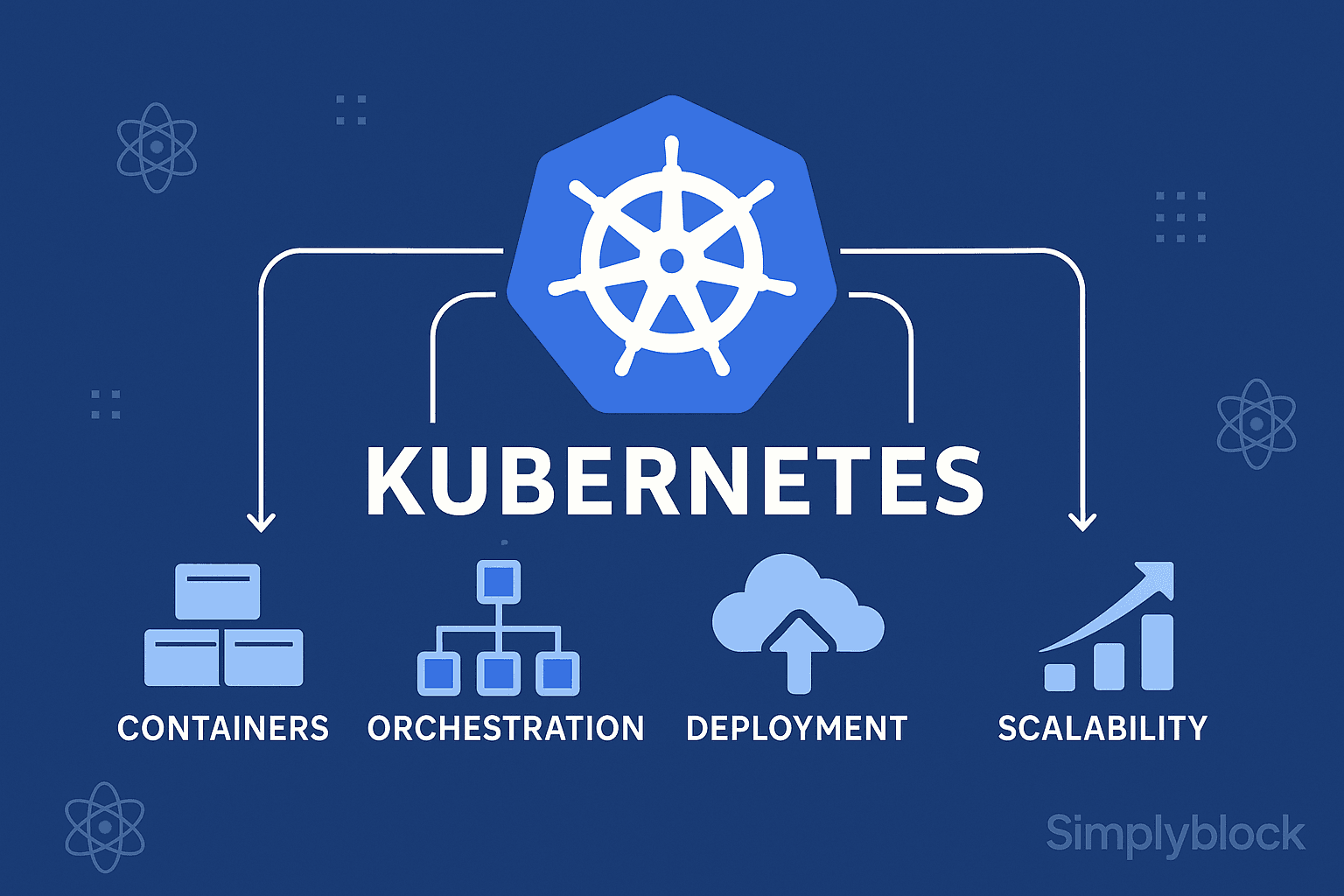Kubernetes
Terms related to simplyblock
Kubernetes, often abbreviated as K8s, is an open-source container orchestration platform designed to automate the deployment, scaling, and management of containerized applications. Originally developed by Google and now maintained by the Cloud Native Computing Foundation (CNCF), Kubernetes provides a robust framework for running applications in distributed environments.
Kubernetes enables seamless scaling, load balancing, and self-healing capabilities, making it a cornerstone for modern cloud-native applications. It integrates with storage solutions like Simplyblock’s NVMe over TCP Kubernetes storage to optimize persistent storage performance.
How Does Kubernetes Work?
Kubernetes operates on a cluster-based model consisting of:
- Master Node: Manages the cluster and orchestrates workloads.
- Worker Nodes: Execute application workloads in the form of pods.
- Pods: The smallest deployable units containing one or more containers.
- Controllers: Automate scaling and manage application states.
- Kubelet: An agent running on each worker node to communicate with the master node.
Kubernetes schedules workloads efficiently across worker nodes, automatically handling resource allocation, scaling, and networking for containerized applications.
🚀 Run Stateful Apps on Kubernetes Without Storage Bottlenecks
Use Simplyblock to get scalable, low-latency persistent volumes for databases, AI/ML, and production workloads.
👉 Use Simplyblock for Kubernetes Backup →
Benefits of Kubernetes
- Automated Scaling: Dynamically adjusts resources based on workload demands.
- Self-Healing: Detects and replaces failed containers to ensure application availability.
- Declarative Configuration: Uses YAML manifests to define application states.
- Multi-Cloud and On-Premise Support: Deploys applications seamlessly across different cloud providers and on-premises environments.
- Storage Orchestration: Works with persistent storage solutions like Simplyblock’s Kubernetes storage.

Kubernetes vs Traditional Virtualization
Kubernetes provides an efficient alternative to traditional VM-based infrastructure by abstracting underlying hardware and automating management tasks. The table below highlights key differences:
| Feature | Kubernetes | Traditional Virtualization |
|---|---|---|
| Resource Utilization | High (container-based) | Lower (VM overhead) |
| Scalability | Automatic | Manual provisioning |
| Deployment Speed | Faster | Slower |
| Storage Handling | Dynamic (Persistent Volumes) | Static disk allocation |
| Orchestration | Built-in | Requires additional tools |
Use Cases for Kubernetes
- Microservices Architecture: Deploy and manage microservices with built-in networking and scaling.
- Hybrid and Multi-Cloud Deployments: Run workloads across AWS, Google Cloud, Azure, or on-prem.
- Big Data and AI/ML Workloads: Process large datasets with scalable computing.
- CI/CD Pipelines: Automate application testing and deployment in containerized environments.
- Persistent Storage for Databases: Supports distributed storage with solutions like Simplyblock’s Kubernetes storage.
Kubernetes and Simplyblock Integration
Simplyblock enhances Kubernetes with high-performance NVMe storage, ensuring low-latency data access for cloud-native applications. By leveraging Simplyblock’s storage platform, Kubernetes users benefit from scalable and resilient block storage, ideal for databases, AI/ML workloads, and stateful applications.
Learn More
For further insights into Kubernetes and storage solutions, visit:
- Kubernetes Official Documentation
- Simplyblock Use Cases – Databases on Kubernetes
- Kubernetes Persistent Volumes
- Cloud Native Computing Foundation
Questions and Answers
Kubernetes manages persistent storage using CSI (Container Storage Interface) drivers that dynamically provision volumes. Choosing a CSI-compatible storage backend like Simplyblock’s NVMe-over-TCP solution ensures scalable, high-performance volumes that integrate natively with Kubernetes workloads.
Traditional storage protocols like iSCSI create bottlenecks in containerized environments. NVMe over TCP offers parallelism, low latency, and higher throughput, making it ideal for Kubernetes clusters running databases, analytics, or high-IOPS microservices. Learn more about NVMe TCP for K8s.
Local storage is faster but lacks flexibility and redundancy. Remote storage, especially when built on protocols like NVMe-over-TCP, provides the performance of local storage with the benefits of remote availability and dynamic provisioning. It’s especially useful in multi-node and multi-tenant clusters.
Common issues include volume binding delays, performance bottlenecks with shared storage, and managing persistent data across pods. Using Kubernetes-native storage platforms with proper CSI support and NVMe backends helps resolve these bottlenecks.
Yes, with the right storage backend. Systems like Simplyblock are built to scale with Kubernetes, offering fast volume creation, high availability, and multi-tenant support—all while maintaining NVMe-level performance ideal for production databases and stateful apps.
